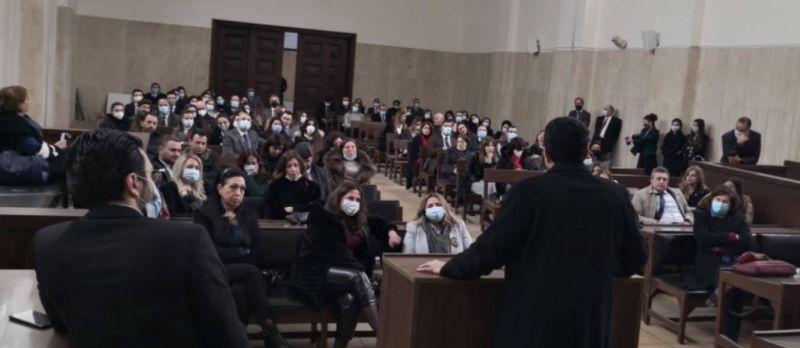
In March 2022, magistrates on strike gathered at the Beirut courthouse. (Credit: OLJ archive)
During Monday’s plenary session organized by the Higher Judicial Council (HJC) to inaugurate the new judicial year, no decision regarding a strike was reached. The session, chaired by Souheil Abboud, saw participation from approximately 120 out of the 550 council members. On Sept. 1, the judges stated via social media their refusal to return to work following the judicial recess. Their protest focused on perceived inadequacies in salaries and working conditions.
Abboud addressed the 300 magistrates who attended the meeting and discussed the efforts undertaken by him and other authorities to secure what he referred to as a “material and moral minimum” for HJC members.
Abboud emphasized the importance of enhancing the working conditions of judges, But also urged magistrates to carry out their public service duties “to the best of their abilities,” despite the challenging circumstances they currently face.
According to the state run National News Agency, “The HJC has resolved to keep its sessions open to provide guidance in light of any forthcoming developments.” .
It’s worth noting that last year, the judicial system was brought to a standstill by a six-month-long judges’ strike.
Pitiful wages
“The meeting did not appear to lean toward a decision to suspend judicial work, as expressed by hundreds of my colleagues at the beginning of the month,” a judge from the council told L’Orient-Le Jour following the session, on condition of anonymity.
“The wheels of justice must keep turning,” the judge added.
Another magistrate working in criminal justice, told L’Orient-Le Jour that in his field, halting work is “impossible.”
Another judge shared the same sentiment, stating that she has no intentions of ceasing her activities and finds her income to be sufficient.
“I come from the Bekaa area and work there, where the cost of living is not as high as in the city,” the judge said.
Conversely, a judge in his forties deemed the current salaries “paltry,” arguing that judges should receive salaries that command respect and not have to rely on grants and donations for their livelihood. In his view, such compensation undermines their dignity and morale.
Nevertheless, “in light of the HJC’s position, the judges who had planned to strike should convene to discuss their decision [whether or not to go on strike],” the judge added.
LL1,000 billion in advance
Currently, magistrates receive grants ranging between $500 to $1,200 in cash, depending on their rank. These grants supplement their monthly salary, which does not surpass LL6 million (equivalent to $67 at the daily parallel market rate).
In accordance with the proposal put forth by caretaker Minister of Justice Henri Khoury, the government approved a one-year advance of LL1,000 billion (equivalent to $11.2 million at the current exchange rate) from the Treasury. This advance is designated for the judge’s mutual fund, presided over by the Chief Financial Prosecutor, Ali Ibrahim. The terms and conditions for repayment are specified in a corresponding decree.
A source closely associated with the mutual fund said Ibrahim is awaiting the receipt of these funds before proceeding with distribution.
“Just recently, the expenses for a colleague’s 40-day hospitalization due to cancer totaled $400,000,” a judge told L’Orient-Le Jour, stressing that these funds are not sufficient.
Apart from the advance, the fund is comprised of sums derived from percentages deducted from the fees for registering lawsuits, and from the compensations awarded by the courts, notably the Printed Matter Court, as well as from traffic fines.
According to Nader Gaspard, President of the Beirut Bar Association, “Judges don't have much to complain about,” adding that the LL1,000 stamps used for formalities before the economic crisis of 2019 have since been replaced by LL50,000 or LL100,000 stamps.
Gaspard believes that the strike is not in the judges’ best interest.
“They need to remain productive,” Gaspard said, explaining, “If they stay at home, they won’t be able to collect income from their judgments, especially those involving orders for damages or compensation related to traffic incidents.”
In his perspective, other members of the legal profession have it worse than magistrates. “Whether they are working or not, judges receive salaries and benefit from donations, whereas lawyers are unable to practice their profession and have no source of income if magistrates are not working,” he said. Gaspard also highlighted the potential harm to litigants and the justice system in general that could result from a halt of judicial activities.
According to the mutual fund source, Ibrahim recently approached Gaspard with a proposal to charge lawyers an entrance of LL100,000 for the use of the parking lot adjacent to the Justice Palace, which they currently have access to at no cost.
The source added that the Bar Association has agreed to a reduced rate of LL50,000.
Gaspard is reportedly leaning towards approving this suggestion, with the condition that by paying this amount, Bar members will be granted multiple entries to the parking lot per day and be given the option to subscribe to a monthly pass for a daily fee of LL40,000.
This article was originally published in French in L'Orient-Le Jour. Translation by Sahar Ghoussoub.
